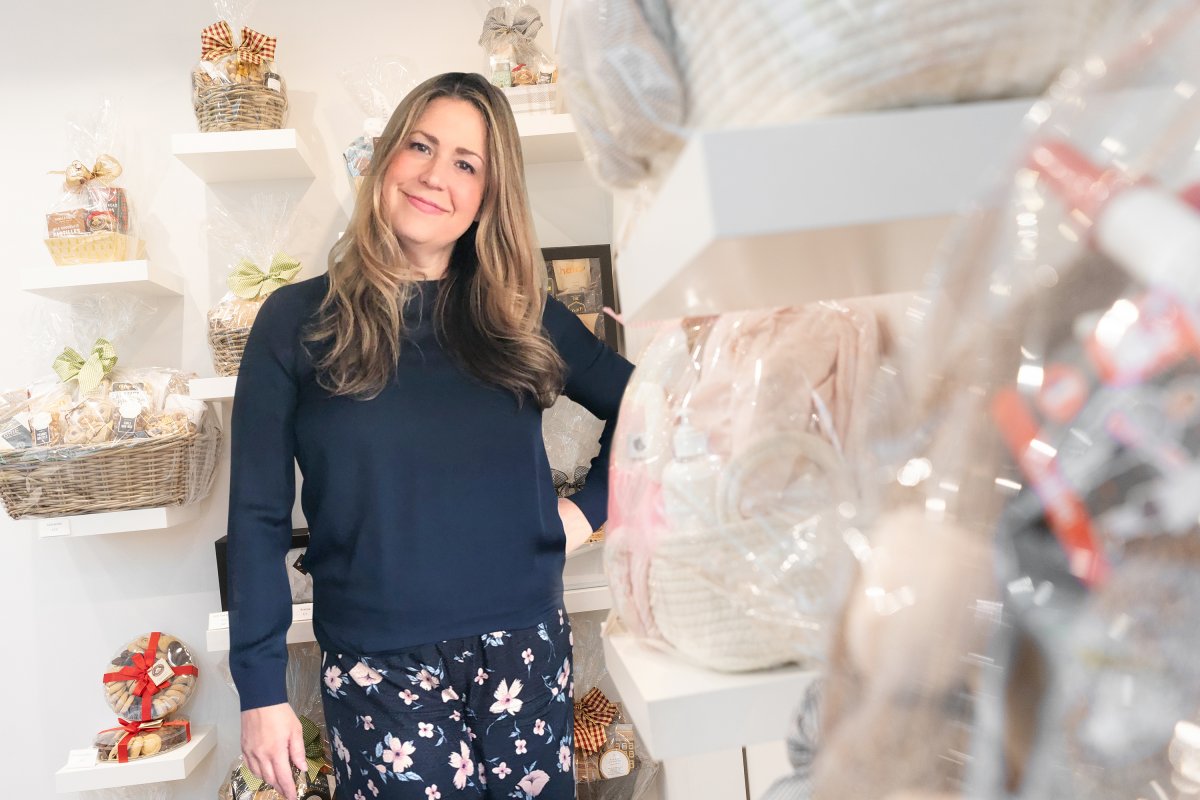[vc_row][vc_column][vc_column_text]To be an entrepreneur, you don’t have to be a founder. Robin Kovitz, President and CEO of Baskits Inc., knows this to be true.
A former investment banker, Kovitz began her career learning the ins and outs of mergers and acquisitions before tackling the world of private equity. She loved the work, but it required long hours—hours that wouldn’t be possible to do when it came to starting a family.
So, she took all that she had learned from buying and selling companies and set out to find a business that she believed in and that she knew she could lead. Eventually, that led her to Baskits.
By acquiring the gift service in 2014, Kovitz became part of a new kind of business community: entrepreneurs through acquisition. The concept is simple enough: acquire a company that you believe you can help build, and build it. However, it comes with many learning curves. As Kovitz puts it, you become an “overnight CEO.”
“I’m still a work in progress, but what I’ve been trying to do is build the company I wanted to work for,” said Kovitz. “A real turning point for me was when I was pregnant with my first child, and all of my advisors were telling me to hide my pregnancy—and I know a lot of women on Bay Street have experienced this.”
Never wanting this to be the case for her employees, Kovitz has worked extremely hard to make sure that Baskits is a place for women to grow in their careers without fear of retribution for having a family life.


As someone who was used to always doing the work, taking the reins of a company, and learning how to lead a team took time. She credits investing time in working with coaches and figuring out her leading style for helping her become the best boss she can be.
“I was honestly a terrible CEO when I first started, but I had the courage to identify that as a weakness and then hire people to help me and really work on it. And I would now say I’m an excellent CEO,” said Kovitz proudly.
A firm supporter—and success story—of entrepreneurship through acquisition, Kovitz is an example of what’s possible when you think outside of the box (or basket!) and try your hand at something new. Through her determination to take on a growing business and build a company culture that encourages a healthy work-life balance, Kovitz is proving that you don’t need to be a founder to make an impact.
For this week’s Women Who Lead article, Bay Street Bull spoke with Robin Kovitz, President and CEO of Baskits Inc., about entrepreneurship through acquisition, becoming a better leader, and building a company culture she wishes existed before.
[/vc_column_text][/vc_column][/vc_row][vc_row][vc_column][vc_text_separator title=”Q&A” color=”chino” border_width=”3″][/vc_column][/vc_row][vc_row][vc_column][vc_column_text]
What was your career like before acquiring Baskits?
I grew up in Calgary with a family business and my dream was to go to Harvard, but I was wait-listed and didn’t get in. And so I “settled” on Queen’s Commerce, which was the best thing that ever happened to me. It was an incredible program and it led me to investment banking. Throughout my summers, I interned in investment banking in Calgary. Then in Toronto, I joined CIBC in mergers and acquisitions and I had a great time learning how to sell businesses on the sale side. Then I went and did my Master’s at Harvard, which was a dream come true.
When I was at Harvard, I came to know a lot of the guys—mostly guys—who were in private equity. They had the sophistication of my family who were business operators and the guys in investment banking who were really sophisticated financial analysts. I thought private equity was just such a neat combination of those two skillsets. And so I came back to Canada, determined to work in private equity, on the buy side, where you invest in businesses and then you help operate them. And I did that for many years and loved it.
Then I turned the ripe old age of 30, which is a magical number for a lot of women. My husband was really excited to start a family and I was too, but I just couldn’t reconcile how I could keep up with my career and also be the kind of mom I wanted to be. My competitive advantage was always working harder than everybody else, working 17 hour days at my desk.
This was 10 years before COVID and I wanted to work from home. I figured if I could work from home with a small baby, I could have it all, which is so funny now that everyone works from home [laughs]. So long story short, I decided to go out on my own and try and buy a small business and then operate it and see what I could do on my own. Almost seven years later and here we are! Baskits has grown by leaps and bounds. It’s five times bigger than it was when I bought it. It hasn’t been a straight line, but it’s been a really fun journey.


Entrepreneurship through acquisition is an emerging concept—and it was a couple of things. First of all, I was burnt out. I was a recovering investment banker and I was burnt out before we started acknowledging burnout as we do now. Like most people not feeling appreciated and feeling overworked, I thought that being my own boss would be a great opportunity to build something.
I had my traditional set of private equity investment criteria, and it’s almost like finding a life partner. You want him or her to be X, Y, and Z, and you probably only get your top three, right? Same thing when you make an investment. And so I had my laundry list of things that I wanted to find in the company that I bought. Then I went out for four years and I met with business owners all across the GTA.
I limited my search geographically, and I actually first passed on Baskits. I thought, “Not for me, no barriers to entry.” And as time went on, I realized it would be a great business for me. I love gift-giving. The selfless act of sending someone a gift, connecting with someone, was kind of like returning to my roots of feeling connected and appreciated again. So, I settled on Baskits and I also had the lens that it’s a large market that’s very fragmented. So, since I bought Baskits, I’ve acquired two competitors and my plan is to acquire some more.
As you said, entrepreneurship through acquisition is an emerging concept. What were the hurdles of switching into that entrepreneurial mindset having come from working with and for other people to being at the top of the chain and having your say in where things are going?
Night and day, right? I’d come from doing a hundred million dollar deals to running a very small business.
I’d say the first challenge was access to capital. As part of my role in investment banking and private equity, I was responsible for managing the bank relationships with some of our portfolio companies. So I felt confident that I was experienced with that. And I was very shocked to see how easy it is to borrow $10 million or $100 million, but how hard it is to borrow $1 million. So that was a real sort of shock. With access to capital for entrepreneurs in this country, there’s a massive hole. And that scared me. I thought, “Here I am with a financial background, I can build a model, talk the talk, I have relationships—and I can’t raise a million dollars.” That’s pretty scary for the landscape of entrepreneurship in our country.
The other thing is I wasn’t ready to be a CEO. I thought about starting something like I think women do on maternity leave, but 90 percent of businesses fail. So entrepreneurship through acquisition was the right path [for me] because you’re acquiring something that’s established. Here I was, having been successful in my career because I was a doer. I was great at building a deck or financial analysis or writing an article. And now I was the leader of this company and sort of overnight CEO with all the challenges that come with former ownership. That transition has actually been a really difficult journey. Over the last six years, I’ve hired coaches, I really worked on my style, learned to let go, to teach, to delegate, and I’m still not there! I make mistakes every day. But the transition from doing to managing has been a big journey for me.
And obviously, with the pandemic, gift-giving through a delivery service like Baskits, has taken off. It was kind of the only way that we could stay connected to our loved ones during this time. What did this year look like for you from a business perspective?
Yeah, it’s interesting. I think there have been a series of positives and a series of negatives.
On the negative side, our physical storefronts are closed and they have been for over a year. A lot of our corporate gifting business is quiet because people are not in their offices and often you don’t have your customer’s home addresses. But on the other side of the coin, our B2C business and corporate gifting to employees is growing.
When I bought the business, we put a lot of things in place to professionalize the platform and get it ready for growth. We’d like to be $100 million in sales in the next five years and we spent the last three years really growing at 30 to 40 percent a year. When I look at the numbers, this past year was a little bit slower, but still on par. And so it’s difficult to say. You’re right in that we’re meeting less and therefore sending more, but there are other parts of our business that are down. I’m not sure every gifting business is up, but I think we’ve made some good decisions that have positioned us well.
In addition, on the negative side, there are tons more competition—every restaurant is now a gift box company!
For Baskits, how did you navigate leaning into being attractive to the consumers that are sending directly to their loved ones?
The gift business is complex. In many ways, we’re in the logistics business. When you think about the recipe of what goes into a gift basket, it’s many different components and it has to be timed perfectly. So what I noted when I first started studying the industry is that a lot of people take beautiful pictures and then what they send doesn’t match what’s on their website. And personally, I took a big issue with that. I think that’s horrible! I just had a baby and I was receiving a lot of gifts and I was surprised because it was a while before it arrived, and then [when it did arrive] there were a lot of low-quality items in the gift. And so when I took those two business challenges together, I thought, wouldn’t it be amazing if you filled a gift basket with only the highest quality stuff? And wouldn’t it be amazing if every time we send something out, it looks exactly like the picture, which none of our competitors are able to do?
So it was that evolution of meeting with top brands, earning their trust. And there was also an enormous investment on the backend in the technology required on the enterprise resource planning side so that we can flawlessly execute. When someone sends a gift using us, they’re lending us their reputation. It’s all about trust and we take that very seriously.


Despite the crazy ride of the pandemic, you really stepped up as a CEO, offering employee bonuses, even giving them the paid time-off for vaccination appointments before that was really a thing. Why was this important to you from the get-go?
I have not been a great CEO from the start, let me just be clear. I’m still a work in progress, but what I’ve been trying to do is build the company I wanted to work for. A real turning point for me was when I was pregnant with my first child, and all of my advisors were telling me to hide my pregnancy—and I know a lot of women on Bay Street have experienced this. It was such a turning point for me because it would affect my comp or other things where I just thought, “Isn’t it sad that here’s something I’ve dreamt of my whole life. A beautiful, wonderful, exciting moment for me. And it has to be in opposition to my career?! Why can’t I have it all?”
For the younger generation, it’s getting much better, but I looked up and didn’t see examples of women who had done it. So my dream was to build a place where women felt that they could learn and grow, go part-time, take a summer off, be with their kids, leave at three o’clock and still have a career that could grow. And so I’ve worked really hard to build the company that I’d wished I’d worked for. This month actually, it [this dream] came true for me! Two of my team members are pregnant and they told me because they were so excited and they knew that it wouldn’t be something that would limit their career growth. And that was a real ‘aha!’ moment for me that I think I’ve achieved what I tried to do.
That’s awesome! Previously, you said going to Harvard was your dream, and you got there! You even work with its marketing admissions board, lending your expertise. You also count Queen’s Commerce as your alma mater. Aside from these great educational opportunities, what’s the most important thing you’ve learned that wasn’t taught to you at school?
Such a great question! This might surprise you; I would say becoming a mom. And that’s the irony of all of this because it’s made me a better employee, a better manager, a better coach, a better CEO. Becoming a mom taught me so much. It taught me patience and flexibility and skillsets that I didn’t have before. I think that that’s so important as a CEO, the ability to listen, to change gears quickly, to build morale. And a lot of those things I learned through becoming a mother.
And as a woman who shifted careers at a very kind of pivotal point in your life—a point when it’s easy to stay where you are and not take any risky ventures— what advice would you give to other women who are mid-career, who might want to make a switch to entrepreneurship, but are kind of scared to take that step?
I remember being terrified because for 10 years I built a career and a reputation. I was so scared that if I left base, I could never go back. That just felt so big to me. But I had the counsel of my father who was a successful entrepreneur and others who just kept saying that that’s crazy. If you go out there and you fail as an entrepreneur, people are still gonna want you back because of who you are and what you will take away from that. So, I would tell anyone, especially any women considering leaving or taking some time out mid-career, to just go for it.
I know it’s hard, but you really have nothing to lose. I think you can always find a job; we’re so lucky in North America, there’s always an opportunity to become employed. I think if you’re always going to wonder what would’ve happened if you don’t try. Just jump and build the airplane as you’re going.
As this is a Women Who Lead article, who’s a woman who leads in your life that you’ve kind of looked up to throughout your career?
I’m actually a little off today because my grandmother recently passed away. She was a woman I looked up to, I still do and will, always. She advised prime ministers. She was a member of the Order of Canada, at a time when it was still unusual for women. But yet, she was always our grandmother. We’d come over and she’d made dinner and, to me, that juxtaposition was so interesting. I feel so lucky that I had that role model, that showed me you can absolutely be a pioneer and pave the way professionally but also still be feminine and a mother and a grandmother. So, my grandmother Muriel Kovitz, who was an amazing person.
I’m so sorry for your loss. Thank you for sharing that and her honoring her life in that way. Was there anything else you’d like to speak about today?
One thing I’ve learned, now 10 years into my entrepreneurial journey, is that your skills are not fixed. For example, I was honestly a terrible CEO when I first started, but I had the courage to identify that as a weakness and then hire people to help me and really work on it. And I would now say I’m an excellent CEO.
I think if you feel that you have a weakness, my advice would be not to be shy away from it, but to identify it and work on it, because it can be overcome. And something now that I really look for when I’m hiring is a growth mindset. And whether outcomes are within your control and can be impacted by you.
We have an incredible team at Baskits, I want to be clear about that. We’ve grown 5X in the last six years because of the team, not because of me. I have some incredible people here. There are 40 of us and we all have these growth mindsets. The craziest things happen to us every day, and they’re like, “Let’s try, what’s the worst that can happen?” And so we have a small team that achieves big things.
[/vc_column_text][/vc_column][/vc_row][vc_row][vc_column][vc_separator color=”chino”][/vc_column][/vc_row]
[yikes-mailchimp form=”1″ title=”1″ submit=”SUBSCRIBE”]










